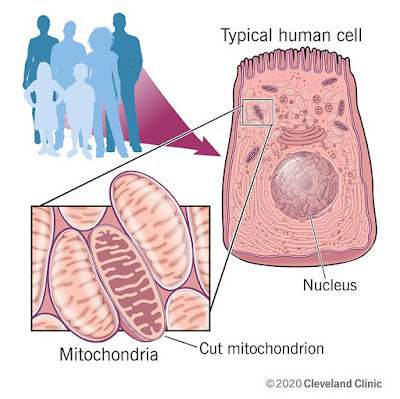Fibromyalgia (FM) is one of the most common musculoskeletal pain conditions.
Although the cause of FM is still unknown, mitochondrial dysfunction and the overproduction of reactive oxygen intermediates (ROI) are common characteristics in its development. ROI's play diverse roles in inflammation
Mitochondria are the “energy factory” of our body. Mitochondrial diseases are long-term, genetic, often inherited disorders that occur when mitochondria fail to produce enough energy for the body to function properly. CLEVELAND CLINIC
The reserpine experimental model can induce FM-related symptoms in rodents by depleting biogenic amines. However, it is unclear whether reserpine causes other processes associated with the disease characteristics of FM.
So far, no one has investigated the relevance of mitochondrial dysfunction in the reserpine-induced experimental FM model using protection- and insult-based mitochondrial modulators.
What are mitochondria?
Mitochondria are the “energy factory” of our body. Several thousand mitochondria are in nearly every cell in the body. Their job is to process oxygen and convert substances from the foods we eat into energy. Mitochondria produce 90% of the energy our body needs to function.
METHODS
Reserpine (1 mg/kg) was subcutaneously injected once daily for three consecutive days in male Swiss mice. We carried out analyses of reserpine-induced FM-related symptoms, and their modulation by using mitochondrial insult on ATP synthesis (oligomycin; 1 mg/kg, intraperitoneally) or mitochondrial protection (coenzyme Q10; 150 mg/kg/5 days, orally). We also evaluated the effect of reserpine on mitochondrial function using high-resolution respirometry and oxidative status.
RESULTS
Reserpine caused:
- nociception,
- loss in muscle strength, and
- anxiety- and depressive-like behaviours
These symptoms were consistent with the clinical symptoms of FM. They did not induce body weight and temperature alterations or motor impairment.
Reserpine-induced FM-related symptoms were increased by oligomycin and reduced by coenzyme Q10 treatment.
Reserpine caused mitochondrial dysfunction by negatively modulating the electron transport system and mitochondrial respiration (ATP synthesis) mainly in oxidative muscles and the spinal cord.
These results support the role of mitochondria in mediating oxidative stress and FM symptoms in this model. In this way, reserpine-inducing mitochondrial dysfunction and increased production of ROI contribute to the development and maintenance of nociceptive, fatigue, and depressive-like behaviours.


No comments:
Post a Comment
Thanks for your input